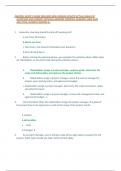Exam (elaborations)
PMG202c MOOC 3 EXAM NEW VERSION UPDATE ACTUAL EXAM 210 QUESTIONS AND CORRECT DETAILED ANSWERS (VERIFIED ANSWERS) 100% PASS SOLUTION /ALREADY GRADED A+
- Course
- Institution
PMG202c MOOC 3 EXAM NEW VERSION UPDATE ACTUAL EXAM 210 QUESTIONS AND CORRECT DETAILED ANSWERS (VERIFIED ANSWERS) 100% PASS SOLUTION /ALREADY GRADED A+
[Show more]



